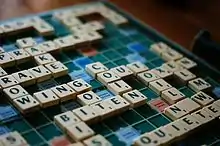Harriet T. Righter
Harriet T. Righter (February 24, 1878 – June 8, 1982) was an American businesswoman, the president of Selchow and Righter, a game company, which was co-founded by her father. Her best-known addition to the company's properties was Scrabble, which she thought was "a nice little game".
Harriet T. Righter | |
|---|---|
| Born | February 24, 1878 Brooklyn |
| Died | June 8, 1982 Brooklyn |
| Nationality | American |
| Occupation | Businesswoman |
| Known for | President, Selchow and Righter (1923-1954) |
Early life
Harriet T. Righter was born in Brooklyn, the daughter of John H. Righter, who co-founded the game company Selchow and Righter with Elias Selchow in 1870. She had sisters, Katherine and Jessie, and a brother who died young. She attended Wellesley College.[1]
Career
Righter did settlement work in New York as a young woman,[2] and was the first president of United Neighborhood Houses of New York in 1921.[3][4] She was active in the City Fusion Party in Brooklyn in the 1930s,[5][6] and worked on the mayoral campaign of Fiorello LaGuardia in 1933.[1] In 1936, Mayor LaGuardia named Righter to the board of trustees of the Brooklyn Public Library.[7] She was also chair of the library's Friends of the Library organization.[8]
Righter became president of Selchow and Righter in 1923. Under her leadership, the company began manufacturing (not just selling) games, expanding advertising and promotion of the games, and offering popular games in different editions, to appeal to a wider range of buyers.[9] Her best-known addition to the company's properties was Scrabble, when Selchow and Righter licensed the game from entrepreneur James Brunot in 1952. "It's a nice little game. It will sell well in bookstores", she remembered saying about Scrabble when she first saw it.[10] In its second year as a Selchow and Righter-built product, nearly four million sets were sold.[11] She retired from the executive role at Selchow and Righter in 1954, but stayed active in the company as an adviser and public face.[1]
Personal life
Righter died in 1982, aged 104 years, at her home in Brooklyn.[1]
References
- "Harriet T. Righter, 104; Led Scrabble Company". The New York Times. 1982-06-09. ISSN 0362-4331. Retrieved 2020-05-08.
- "Mrs. Samuel Barnett Visiting Miss Righter". Brooklyn Life. 1920-11-13. p. 7. Retrieved 2020-05-08 – via Newspapers.com.
- Legislature, New York (State) (1921). Legislative Document. J.B. Lyon Company. p. 3000.
- "Harriet T. Righter". Daily News. 1982-06-09. p. 31. Retrieved 2020-05-08 – via Newspapers.com.
- "Miss Harriet T. Righter Hostess for Maurice Davidson". The Brooklyn Daily Eagle. 1933-10-17. p. 17. Retrieved 2020-05-08 – via Newspapers.com.
- "Miss Harriet Righter Hostess to Women of Political Party". The Brooklyn Daily Eagle. 1934-05-10. p. 23. Retrieved 2020-05-08.
- "Mayor Names For to Board of Brooklyn Public Library". Times Union. 1936-02-01. p. 1. Retrieved 2020-05-08 – via Newspapers.com.
- "Honor New President of Library Trustees". The Brooklyn Daily Eagle. 1940-02-29. p. 8. Retrieved 2020-05-08 – via Newspapers.com.
- Petrik, Paula (1986). "The House That Parcheesi Built: Selchow & Righter Company". The Business History Review. 60 (3): 423–424. doi:10.2307/3115884. ISSN 0007-6805. JSTOR 3115884. S2CID 156003366.
- Fatsis, Stefan (2001-07-07). Word Freak: Heartbreak, Triumph, Genius, and Obsession in the World of Competitive Scrabble Players. HMH. pp. 171–172. ISBN 978-0-547-52431-3.
- Fatsis, Stefan (August 17, 2012). "The Case of the Stolen Blanks". Slate. Retrieved 2012-08-19.
Scrabble transitioned from living-room novelty—nearly 4 million sets were sold in 1954—to competitive passion in the 1960s, when it landed alongside chess, backgammon, and bridge in smoke-filled games parlors in New York City. ... When the tiles were placed in bags during games, unscrupulous players could feel around for the blanks because they had no grooves, a tactic known as "brailling".
